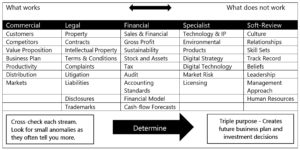12 min read
Completion: Selling A Business And What To Expect
Once a deal is agreed, an exclusive period with one buyer is typically undertaken followed by a focused push to finalise the transaction. This involves the purchaser ensuring that they are buying what they believe are being sold through a process of due diligence, finalising any funding requirements, and working with the buy-side to agree a definitive legal agreement. This period can be fraught or seamless depending on how well the process has been run beforehand, particularly concerning how well the business has been represented.
Due Diligence
The due diligence process serves to confirm all material information and facts regarding the business or company. It is the ‘diligent’ research and checking process that a buyer should take before finalising a purchase. Due diligence will identify what works and what does not when it comes to selling a business, it will confirm or question the value and investment, and drive post-sale strategy. The due diligence list is too long to publish in this synopsis, but the key areas that buyers should investigate for the ‘perfect sale’ are shown below:

Due diligence is an essential, important, and professional part of any transaction. It should be approached by both sides with resources, open communication, coordination, and proportionate analysis. I have used the word ‘proportionate’ carefully. Due diligence as a practice comes from larger corporations, who are happy to maximise hours paid for an advisor to hedge against risk and to create a corporate veil (someone else to blame!) if matters go wrong. This can result in ticking boxes on a heavyweight basis just for the sake of it and perhaps, advisor fees! A good assessment includes:
- What does not work in the business and, as important, what does?
- Consider what are the structural risks to the business?
- What is the value of Intellectual Property, the process, or threats in market trends?
- Is the business well run and in order, with a professional team?
- What is the potential of the business and what are the value drivers?
- Technology and culture are growing areas of due diligence and often key value drivers.
- What is the strategy for integration now that the business is understood better?
If there are negatives, remember that the positives may offset these, alternatively the course of action might be:
- Manage matters legally in warranties and indemnities
- Conduct further cross-checks and dig deeper to understand the issues better.
- Renegotiate the deal structure or value.
- Delay until the negative is corrected.
- Some of the best investment decisions are the ability to say ‘no’.
Legal Aspects of The ‘Perfect Sale’
In most transactions, the parties will agree a ‘heads of terms’ before entering into the full legal process. This sets out the ‘key’ commercial aspects of the transaction, such as price and deal structure. This document is not normally binding except in respect of confidentiality clauses and exclusivity. ‘Crafting’ the heads of terms can save significant misunderstanding between the parties, particularly if the deal is structured.
A share sale can, in theory, occur simply by an exchange of share certificates and a transfer of money. In practice, a sale and purchase agreement (“SPA”) will be used. This contract represents the key commercial and pricing aspects of negotiations and risk allocation. Considerations of this document include:
- Identifying the financial risks in the acquisition and addressing them by a deal structure, or through warranties and indemnities to enable value adjustment.
- Guarding against claims on warranties and indemnities and avoiding value erosion.
- Translating the agreed financial terms into the right completion pricing mechanisms.
- Considering the adjustments to be made between Enterprise Value and Equity Value at completion, such as with surplus cash, debts and/or working capital.
- Reflecting any dispute resolution mechanisms related to the purchase price adjustment, including as appropriate, consideration of tax-related items.
- Mitigation of legal and financial risks identified during the due diligence process.
- Restrictive trade covenants (non-compete clauses).
Warranties, Indemnities and Disclosures
A company is a legal entity and when a buyer acquires shares, they buy all the company’s current and future liabilities, whether known or unknown. Commercial law is based on the Latin phrase ‘Caveat Emptor’- meaning ‘buyer beware’. The principle is that the buyer alone is responsible for checking the quality and suitability of goods before a purchase is made. Consequently, in the due diligence process, we seek to understand the knowns and the unknowns of a business. However, the buyer is usually unable to gain a complete knowledge before committing to buy, and therefore acquirers will seek to offset risk and the unknowns by adding warranties and indemnities about the business in the SPA.
Warranties and indemnities re-allocate risk between the seller and the buyer by creating future potential price adjusters. The quality of these protections enhances the current value. Warranties are ‘seller’ statements that certain facts are true. If, following the purchase, the buyer subsequently discovers a breach of these facts, they can claim damages. Indemnities take the warranty further in terms of providing specific ‘seller’ promises to cover losses if specific events occur. Insurance can be a useful tool to hedge the risk on some transactions when it comes to selling a business, and it should be seriously looked at and considered.
As well as the SPA, there will be service contracts, possible staff consultancy contracts and often shareholder agreements if not all the shares are being sold. There is also a myriad of minutes, banking covenants and Company’s House forms to complete. One should remember that selling a business is a time-consuming, non-corner cutting process, and your legal team will need to be managed carefully.
Set up a data room and track progress. Step in when negotiations become fraught and take commercial views beyond the legal position. Lawyers operate on a worst-case scenario, which is correct, but both sides should remember that the perfect deal is one which happens where both sides feel they have won.
Timescales and Managing the Process When Selling A Business
This is a project, and its efficiency will depend on how it is initially set up. There are many techniques, tools, and advisors to help when it comes to selling a business, so rather than a detailed analysis, we are concentrating here on the context of how to best manage the process. We see this as steps on a timeline, which of course will be dictated by the transaction itself and both the buyer and seller motivation. Typically, a deal can be completed in three months from agreement, but sometimes it can be much faster, particularly where funders are not involved.
- Be clear on roles: the project leader, usually the M&A adviser, needs the trust of the buyer and seller as well as strong administration, operation, organisational and, increasingly with the advent of data room management, IT skills.
- Agree timeline objectives: run concurrent streams rather than a step approach. Make sure that everyone has the details of all contacts and is prioritising availability.
- Stick to the schedule: deals with unending negotiations can experience ‘deal fatigue’ and the transaction is less likely to happen.
- Involve and Communicate: like any project, clear and shared collaborative tools are essential. Asking key management early on how they want to get involved can also help relationships later. A weekly update with all key parties can also be a critical tool. Make sure your advisers are talking regularly, that they are flagging issues and noting documents of interest to each other. Any truly ‘material’ due diligence issues will have implications spanning across all areas – legal, financial, and commercial. It is also useful to have face-to-face interviews with the key management of the target company to obtain first-hand information and/or clarification regarding specific issues. Often sellers will restrict access until milestones are achieved and this is a reasonable stance.
- Reports: long reports to justify fees are not acceptable. The approach is to seek concise reports with executive summaries and then support these with well- catalogued and indexed data. For example, if there is an issue with terms and conditions, highlight the issue and link it to the data room and the actual indexed terms and conditions.
- Collaboratively adjust: as information flows, make sure this is shared. Any focus points can be highlighted, and issues or challenges addressed at each point. If there are potential showstoppers, deal with them as you go and discuss the issues between the parties. The approach is not to create attrition on deal value, but rather to reinforce value and shape the deal around any challenges.
- Prioritise: detailed due diligence on the target company is always recommended but high-level reviews can be helpful to highlight red or yellow flags, that is, areas that require further investigation.
Completion
The ‘perfect’ sale must be defined as one that happens on a win/win basis with both sides being comfortable with the terms agreed. Some people argue with this citing the trading adage that if you have bought, you paid too much and if you sold, you sold too cheap. In other words, if each side feels equally uncomfortable this is okay, if the feeling is mutual.
Selling a business is no easy feat, and we hope that this series of article on the ‘perfect’ business sale has been informative. Avondale are EME business advisors. Through our management consultancy, we support growth and scaling up. Through our M&A and corporate work, we secure investment and finance for EME businesses, help people buy and sell companies and enhance shareholder value. We recognise ambitious owners who require ambitious, specialist advisors.
In week 5, the last of this series we explore what happens after your ‘perfect’ sale. If you missed any of our previous articles on selling a business and all of the facets surrounding it, visit our Knowledge Base for the other articles.
If you would like to discuss any aspect of our services in confidence or would like some advice on selling a business, please call +44(0)20 7788 8250 or email us at av@avondale.co.uk.






